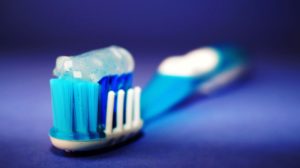Sensitive Teeth? One of these Toothpastes Can Help!
 Millions of Americans suffer from sensitive teeth. You know . . . the sharp zing you feel when your ice cold drink hits that one tooth. Or maybe all of your teeth are sensitive. You do not have to just live with sensitive teeth.
Millions of Americans suffer from sensitive teeth. You know . . . the sharp zing you feel when your ice cold drink hits that one tooth. Or maybe all of your teeth are sensitive. You do not have to just live with sensitive teeth.
Scientists are continually studying and testing new materials to find substances that can strengthen teeth, fight cavities, and relieve the pain of tooth sensitivity. The main function the scientists are looking for in these materials is the ability to remineralize tooth structure.
What is Remineralization?
Remineralization is the process of adding vital minerals back into the hard structure of teeth after attacks from acid and bacteria remove them (which is the process of demineralization). The loss of minerals in the process of demineralization is what leads to cavities, acid erosion, and sensitive teeth. By enhancing the remineralization process, various ingredients in toothpaste can improve your symptoms of sensitive teeth.
How Does Remineralization Help Sensitive Teeth?
Most tooth sensitivity is caused by the exposure of the roots of teeth. Roots do to have the protective coating of enamel that the exposed portion of the tooth has. Enamel is susceptible to demineralization, but it is stronger than dentin, which is the tooth structure making up the core of teeth including its roots. Dentin has small pores in its surface, with tubules that connect to the nerve within each tooth.
Without an enamel covering, dentin in areas of root exposure quickly transfers the sensations of hot, cold, sweet, and acidic to the nerve. Because dentin is so much softer than enamel, it demineralizes much more rapidly. The process of remineralization hardens dentin and closes the “pores” on its surface. This means that the nerve experiences fewer sensations, and you feel less sensitivity.
What Ingredients Promote Remineralization?
 There are several chemicals that perform really well in research studies about remineralizing enamel and dentin. Even though they are current topics of research, they are already available on the market today. Here are the ones to look for and give a try. They are not all commercially available in stores in the US, but you can purchase them online.
There are several chemicals that perform really well in research studies about remineralizing enamel and dentin. Even though they are current topics of research, they are already available on the market today. Here are the ones to look for and give a try. They are not all commercially available in stores in the US, but you can purchase them online.
- Amorphous Calcium Phosphate (ACP) – This ingredient supplies the minerals needed to build back enamel and dentin worn away from the acid attacks of bacteria and acidic foods and drinks in our diets. Studies show that Enamelon toothpaste successfully remineralizes tooth structure with its active ingredients, ACP and fluoride.
- Arginine – Arginine is an amino acid which neutralizes the acid produced by cavity-causing bacteria. It works best when combined with both calcium and fluoride. Colgate makes a few products containing arginine, which they call their Pro-Argin Technology.
- Nanohydroxyapatite (nHAP) – This bioavailable material mimics the mineral naturally occurring in enamel and dentin. It is able to incorporate itself into weakened, demineralized tooth structure. nHAP toothpastes have been available in Japan since the 1980’s.
Before you ask, no, there is no toothpaste that contains all three of these ingredients. And there are no studies showing that that would even be advantageous.
The studies do show that these ingredients typically perform better in the remineralization process when combined with fluoride. However, they can also provide some benefit for patients who choose to avoid fluoride. (We do not recommend avoiding fluoride, but we do with to respectfully accommodate our patients who prefer to do so.)
The best tactic is to select a toothpaste containing one of these active ingredients and use it exclusively for a month. If you do not feel a noticeable change in your level of sensitivity, then try a different toothpaste with one of the other active ingredients.
What if None of the Toothpastes Help Your Sensitivity?
You knew it was coming, didn’t you? If none of these active ingredients make a difference in your tooth sensitivity, then you need to see a dentist as soon as possible. Sometimes sensitivity indicates a serious dental problem, like a large cavity or a cracked tooth. There is no magic ingredient that will fix sensitivity that results from dental disease. Only dental treatment will remove the cause and thus eliminate the sensitivity you feel.
Another reason to see your dentist is that we have additional weapons in the fight against sensitivity. We can perform laser desensitizing procedures or apply professional desensitizing treatments to the offending area. We can also prescribe toothpastes, gels and mouthwashes that may be more effective than what you can buy over the counter.
More Questions about Sensitive Teeth?
Call Designer Smiles today to schedule a consultation with Dr. Ann and Dr. Lauren. They can assess your current situation to determine the cause of your sensitivity, and then offer treatment options or over-the-counter product recommendations to alleviate your symptoms..
